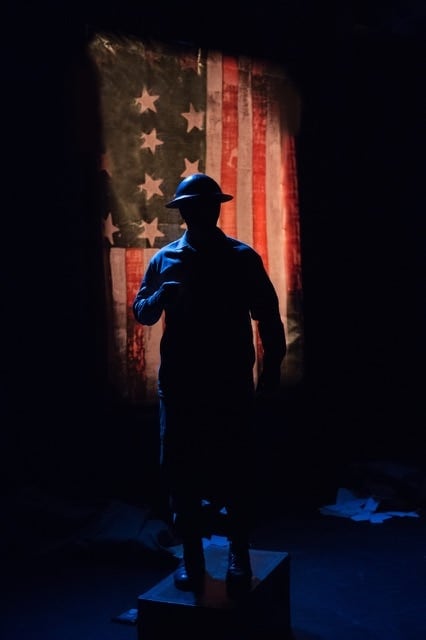In the span of an hour, give or take, Douglas Taurel becomes more than a dozen characters, including military members participating in various conflicts throughout the centuries, plus two women and a child.
He jumps back and forward through time, switches service branches every so often, swigs liquor, smokes weed in Vietnam, smokes a cigarette in a World War I trench, does pushups at the behest of a drill sergeant, becomes a drill sergeant … there's a lot of ground to cover.
In his one-man show, " The American Soldier," Taurel reads and re-enacts letters from troops and their family members dating back to the American Revolution. Whether they're written to old friends, to new crushes or to (or from) worried (or shattered) parents, familiar themes of combat emerge throughout the generations, post-traumatic stress among them.
"I had a really hard time seeing veterans struggle, both mentally and financially, when they were coming back from combat," Taurel said, describing his motivation for writing, performing and producing the show. "And I felt like bringing awareness to that. Not enough awareness can be brought to that"
He started looking up letters in the New York Public Library nearly a decade ago. He's performed the show to stellar reviews at the Edinburgh Fringe Festival in Scotland, to crowds of veterans in New Jersey and Texas, and in New York City – a 2015 show at an NYC festival came with minimal promotion and drew about a half-dozen audience members, but when Taurel ended it with a salute, a Vietnam veteran in the crowd stood and returned the favor.
The show's next stop is its highest-profile yet, and is coming at a time when several thousand service members will be nearby – a Jan. 22 free performance on the Millennium Stage at the John F. Kennedy Center for the Performing Arts in Washington, D.C., two days after the presidential inauguration. It's one of several shows the center will host in its free-show venue (with about 300 seats) in a partnership with the National Institutes of Health, spotlighting a variety of health and wellness issues.
FAMILIAR TURNS
The source material from which Taurel draws offers few surprises. Some audience members may even recognize a few letters – one piece written by Union Army Maj. Sullivan Ballou to his wife, Sarah, about a week before his death in 1861 was part of Ken Burns' "Civil War" documentary.
The actor lends to the sense of familiarity, having appeared in supporting roles in everything from "Mr. Robot" to "The Americans" to "Blue Bloods" to "Person of Interest" to "Nurse Jackie." If there's a drama on TV, someone who looks like Taurel probably is providing a plot point – maybe it's Taurel himself.
But the show became a passion project for the actor/producer. It's his first try at writing his own material, and it didn't come without some growing pains.
"At first I was trying to be very true to each letter that I was using, that I fell in love with," he said, but "a letter, as much as it might be interesting to be read, it's not interesting to hear it, especially for 55 minutes.
"Eventually, I started working with my director, and he started saying, 'You're going to have to take some theatrical license here.' … Older wars, especially, like with the Revolution: 'I went and shot a squirrel today. Today I ate lunch. We marched 25 miles.' As interesting as that is, it's not that interesting, theatrically, to listen to."

"The American Soldier" spans centuries of conflict using letters to and from service members.
Photo Credit: Courtesy of Douglas Taurel
There are no costume changes, save for the occasional addition of a World War I-era helmet, for instance, to drab, beige-and-green gear that says "Army" without saying when or where. The only major conflict left out is, fittingly, the "forgotten" Korean War – Taurel said it was a tough decision, but he went with a letter from a service member fighting the Battle of Iwo Jima instead.
He's polished the show's edges since 2015 and hopes to turn it into a web series, allowing a deeper look, and wider audience, for the service member's stories. And he hopes to keep politics out of it, even as he preps for a show in the nation's capital as a new administration takes over.
"My play is not pro- or anti-war at all," he said. "It's just trying to be a voice for the veterans and their family members."
Kevin Lilley is the features editor of Military Times.





